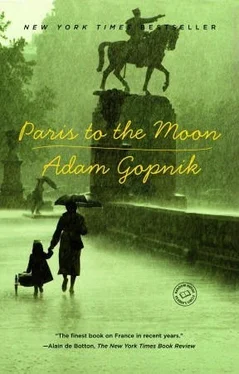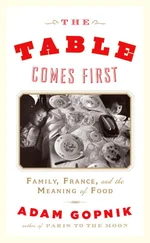We sat in stunned silence.
“Ask him does he do demi-tours,” said Martha.
“You’re wearing stripes?” she asked. I had put on a striped shirt a few minutes before, in the excitement, but I quickly changed it. I put on a suit and tie, in fact—a nice maroon cotton number—thinking that though my New York child had been born with me watching in jeans and a collarless shirt, my French kid ought to see a dad who had a touch more finish.
The drama had begun a few hours earlier, in the middle of the night, and now it was five o’clock and we were on our way to the clinic. At five-thirty, with a baby-sitter for Luke and a suitcase in hand, we were out on the boulevard. I walked to the curb, held my breath, saw that there were cabs at the taxi stand, and, head down, told Martha to wait where she was while I started across the street, preparing to ask a taxi driver to make the demi-tour, my moment come at last.
Far down the boulevard, a single cab with a firelight light appeared. Martha stepped out into the street, just as though it were five-thirty in the evening on Sixth Avenue, got her right hand up in that weird New York Nazi taxi salute, and cried, “Taxi!” The guy came skidding to a stop. She got in, and I followed.
“Twenty-four boulevard du Chateau in Neuilly,” I commanded, my voice pitched a little too high (as it also tends to get in French). “Just cross the street and make the demi-tour,” I added fairly casually, and docilely, at five-thirty in the morning, he swung the cab over to the taxi lane, on other side of the street, and did a full U-turn. He Hew along the boulevard. I took the hand of my queen.
“You’ve got him going the wrong way,” she whispered.
He was too. I waited a few blocks and then told him that I had made a mistake, could he turn around and go the other way? He shrugged and did.
When we got to the clinic, it was shut tight, no lights on at all. The advantages of a big hospital up on Madison Avenue became a little clearer. No one was answering the door, a thing I doubt happens much at Mount Sinai. We banged and cried out, “ Allo! Is anybody there?” Finally, an incredibly weary-looking sage-femme— not our own—wearing sweater and slippers, sighed, let us in, hooked Martha up to an IV, and asked to see our papers. She shuffled through them.
“Where is your blood test for the dossier?” she asked at last. “The doctor has it,” I said. “She’ll be here soon.” “That the doctor has it is of no consequence,” the nurse said. “If your wife wishes to have an epidural, she must have that paper.”
“It’s all the way back home,” I protested, but of course, nothing doing. It looked as though Martha’s epidural, having escaped French syndicalism, was about to be done in by French bureaucracy. Having lived in France long enough to know there was no choice, I found another taxi, rushed all the way home, ran upstairs, tore open the filing cabinet, found the paper, and then took a taxi back, setting some kind of land speed record for trips from central Paris to Neuilly. The sage-femme slipped the paper into the dossier, yawned, put the dossier down on a radiator, and nobody ever looked at it or referred to it again.
The labor got complicated, for various reasons—basically the baby at the last moment decided to turn sideways—and Martha’s doctor, acting with the quiet sureness that is the other side of Parisian insouciance, did an emergency cesarean. It turned out that behind a small, quaint-looking white door down in the basement there was a bloc—a warren of blindingly white-lit, state-of-the-art operating and recovery rooms. They hadn’t shown it to us when we toured the clinic, of course. It seemed very French, the nuclear power plant hidden in the bocage.
The baby came out mad, yelling at the top of her lungs. In New York the nurses had snatched the baby and taken him off to be washed behind a big glass nursery window and then had dressed him in prison garb, the same white nightshirt and cap that the hundred other babies in the nursery had on. (The next day there was also an elaborate maximum security procedure of reading off the bracelet numbers of mother and child whenever either one wanted to nurse.) Here, after the sage-femme and I had given her a bath, and the sage-femme had taped her umbilical remnant, the sage-femme turned to me.
“Where are her clothes?” she asked. I said I didn’t know, upstairs in the suitcase, I guessed, and she said, “You’d better get them,” so I ran up, and came back down to the bloc with the white onesie and a lovely white-and-pink-trimmed baby-style cat suit, which her mother had bought at Bonpoint a few days before. All by myself I carefully dressed the five-minute-old squalling newborn and took her back to her mother, in the recovery room. A day later I would walk the six blocks to the mairie, the city hall, of Neuilly-sur-Seine and register her birth. The New York birth certificate had been a fill-in-the-blanks, choose-one-box business, which we had filled in on our way out of the hospital. The French birth certificate was like the first paragraph of a nineteenth-century novel, with the baby’s parents’ names, their occupations, the years of their births and of their emigration, their residence, and her number, baby number 2365 born in Neuilly in 1999. (It’s got a big hospital too.) After that, of course, would come the weeks of exhaustion and 3:00 a.m. feed-ings, which are remarkably alike from place to place.
But just then, looking at the sleeping mom and the tiny new-born in her arms, I had a genuine moment of what I can only call revelation, religious vision. When people talk about what it is to have a baby, they usually talk about starting over, a clean slate, endless possibility, a new beginning, but I saw that that is not it at all. A birth is not a rebirth. It’s a weighty event. A baby is an absolute object of nature and an absolute subject of civilization, screaming in her new Bonpoint jumper. Life is nothing but an unchanging sea of nature, the same endless and undifferentiating human wave of lust and pain, and is still subject to a set of tiny cultural articulations and antinomies and dualities and distinctions and hair-splittings so fine that they produce, in the end, this single American baby lying in a French nursery in her own fine new clothes, sipping her sugar bottle. In a telescopic universe, we choose to see microscopically and the blessing is that what we see is not an illusion but what is really there: a singularity in the cosmos, another baby born in a Paris suburb. The world is a meaningless place, and we are weird, replicating mammals on its surface, yet the whole purpose of the universe since it began was, in a way, to produce this baby, who is the tiny end point of a funnel that goes back to the beginning of time, a singularity that history was pointing toward from the start. That history didn’t know it was pointing toward Olivia—and, of course, toward Salome over in the other corner of the nursery and little Francois just arrived, not to mention Max and Otto and possibly even Moe, just now checking in at Mount Sinai—doesn’t change the fact that it was. We didn’t know we were pointing to her either, until she got here. The universe doesn’t need a purpose if life goes on. You sink back and hear the nurse cooing in French to the mother and child (“Ah, calme-toi, ma biche, ma biche,” she says. “Be calm, my doe, my doe,” but which one is she talking to?) and feel as completely useless as any other male animal after a birth and, at the same time, somehow serenely powerful, beyond care or criticism, since you have taken part in the only really majestic choice we get to make in life, which is to continue it.
Читать дальше












